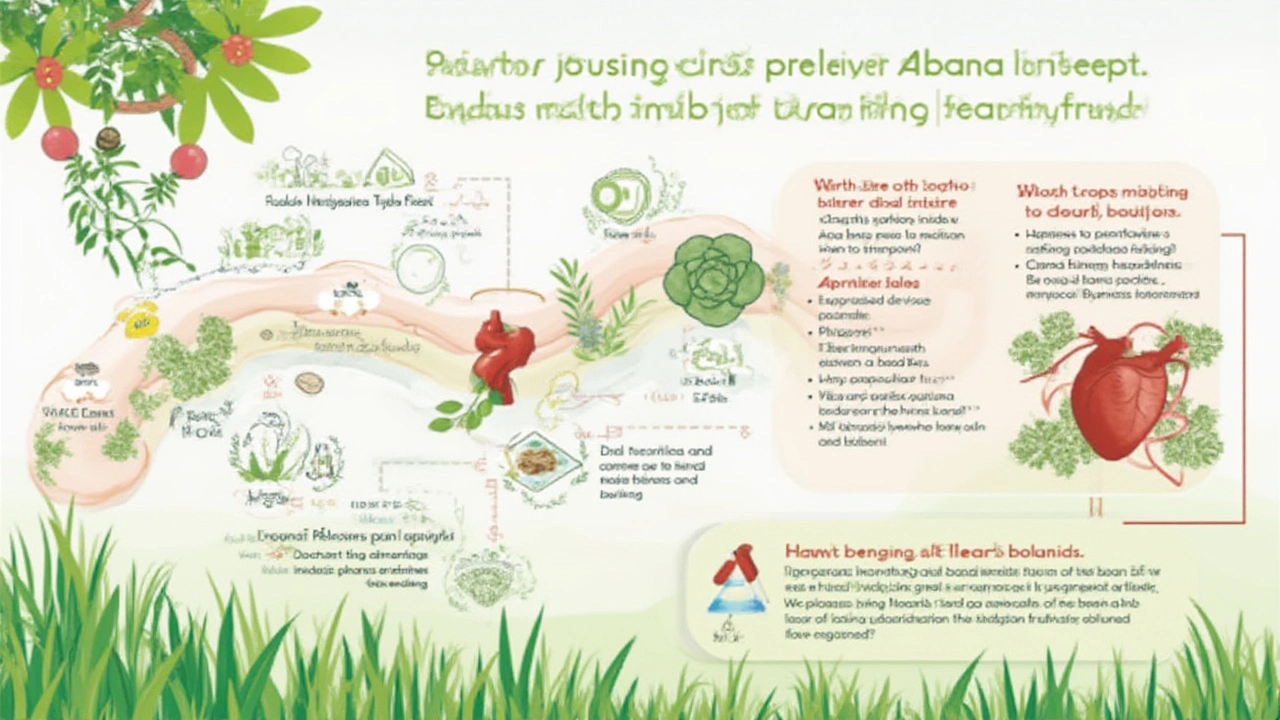Some remedies stick around for generations, and Abana is one of those. You might find it in the medicine drawer of your grandparents, and now it’s gaining attention online, too. This blend of medicinal plants claims to support heart health and manage cholesterol. Curious how this herbal hero made its way into so many homes—and if it’s actually worth the hype? Let’s cut through the noise, unpack what Abana really is, and see if the science matches the stories.
What Exactly Is Abana?
Most folks who talk about Abana refer to a product from Himalaya Herbal Healthcare, a well-known herbal supplement brand. But the word "Abana" itself actually traces back to natural medicine traditions in India. The standard Abana tablet is loaded with extracts from several herbs, each picked for their supposed heart-loving effects. The full recipe is a closely guarded blend, but most versions include arjuna (Terminalia arjuna), gokshura (Tribulus terrestris), shankhpushpi (Convolvulus pluricaulis), and other botanicals famous in Ayurveda. That’s why Abana is often marketed as a heart tonic—meant to support the function of your cardiovascular system without using harsh chemicals or synthetic drugs.
It’s hard not to be skeptical given the huge claims made by some supplement brands, right? Promises can be wild, but Abana’s story isn’t just a marketing fairytale. The main ingredient, arjuna, has centuries of traditional use for everything from steadying blood pressure to strengthening heart muscles. And Himalaya, the biggest name behind Abana, built its reputation by blending old wisdom with modern research. Even the World Health Organization has listed some traditional formulas with arjuna as safe for daily consumption if taken as advised. Today, finding Abana is easier than ever, whether it’s at an Ayurvedic clinic, a health food store, or through online shopping.
Abana comes as tiny round tablets. Some people chew them, while others swallow them with water, typically after meals. Plenty of patients claim to notice subtle changes—maybe they feel less out of breath climbing stairs or notice fewer heart flutters. Still, everyone’s body is unique, so results can vary a lot from person to person. If you’re thinking of trying it, checking for third-party tested brands helps avoid counterfeits. And yes, always ask your healthcare provider if it’s safe to add Abana to your routine, especially if you’re already taking heart medications.
The Science Behind Abana: What Research Tells Us
Let’s get real—most herbal products get side-eyed by the scientific community. Surprisingly, though, Abana and some of its key herbs actually show up in clinical research. Studies in Indian medical journals have looked at arjuna and found it may help reduce total cholesterol and protect heart tissue from damage. In one trial published in the “Journal of Ethnopharmacology” in 2017, researchers gave arjuna bark extract to adults with mild-to-moderate high blood pressure. They noted small but consistent drops in systolic and diastolic readings after eight weeks. Not life-altering numbers, but worth noticing for someone looking for gentle support.
That’s not the only evidence out there. Guggul (Commiphora mukul), another Abana ingredient, gets a lot of hype for managing cholesterol. According to the “Indian Journal of Clinical Biochemistry,” guggulsterone—the active component—can lower LDL (bad cholesterol) while raising HDL (the good kind). These results pop up in multiple human and animal studies. However, in the West, some researchers warn that herbal supplements don't always match label claims, so caution is needed when buying random off-brand products online.
Let’s set the record straight: most of these trials are relatively small, and some lack the rigorous controls used in big pharmaceutical research. But that doesn’t mean they’re useless. Long-term safety also seems good for most people, with side effects rare and usually mild—things like stomach discomfort or a bit of dizziness. The magic here, according to practitioners, comes not from any one herb, but from the combination. Blends like Abana aim for a “synergistic” effect, meaning the herbs work better together than alone. Himalaya says the product “promotes functional efficiency of the heart” and helps manage lipid profiles, which is a fancy way of saying it might keep your cholesterol and blood pressure in check. To quote Dr. S.K. Sharma, a senior Ayurvedic consultant:
“The herbs in Abana have stood the test of time in traditional cardiology, and recent studies support their role in heart health with minimal risk.”
Still wondering if Abana is right for you? It’s smart to compare real-life experiences, study up on the latest research, and get clear on your own health needs. Don’t fall for miracle cures or “one-pill-fixes-all” advertising.

Abana’s Main Benefits: Why Do People Take It?
So, why do people keep reaching for Abana in a world full of pills and prescriptions? First up, its main pull is helping with cholesterol balance. High total cholesterol and out-of-whack ratios between LDL (bad) and HDL (good) cholesterol is a recipe for trouble, especially as we age. Abana’s blend aims to tackle both by working through natural plant compounds. Users often say their blood test numbers get better after a few months, but individual results depend on everything from diet to genetics.
Folks dealing with mild high blood pressure also find Abana appealing. It’s not a replacement for medical treatment if you have serious hypertension, but it can offer some gentle support. The natural ingredients can help relax blood vessels and improve blood flow, so the heart doesn’t have to work overtime. People also use Abana to support their cardiovascular endurance—think about athletes or those who want to keep up with active kids without wheezing after five minutes of soccer. A few research articles claim herbal blends like this could boost exercise tolerance, but the effects are mild compared to prescription options.
Abana may also help folks who worry about stress-related heart problems. Chronic stress can mess with blood pressure and cholesterol, and this product’s herbs are chosen partly for their calming qualities. Many users claim they feel mentally clearer and less frazzled after regular use, probably thanks to adaptogenic herbs like shankhpushpi. And for anyone whose family tree is packed with heart disease, any tool that might push those odds a bit more in your favor is worth considering, right?
One underappreciated benefit is Abana’s minimal side-effect profile. Unlike statins or beta blockers, which can cause muscle aches or fatigue, herbal blends tend to be much less likely to leave you worse off than you started. Of course, “natural” doesn’t mean totally risk-free, so don’t double-up on doses or skip doctor visits.
How to Use Abana for Best Results
Ready to give Abana a try? Here’s what you need to know to use it right. Most packages recommend two tablets, twice a day, best with or right after food. Some people notice mild results after a week or two, but it often takes one to three months to see real changes in cholesterol or daily stamina. Your body isn’t a robot—herbal remedies work gently and slowly by design.
Here are a few tips for anyone starting Abana:
- If you have known liver or kidney trouble, check with your doctor before starting any herbal supplement.
- Stick to a brand that is transparent about sourcing and production, ideally with third-party lab testing.
- Don’t mix Abana with synthetic heart medications unless cleared by a professional—there could be interactions, even if the risk is low.
- Track your blood pressure and cholesterol at home and jot down any side effects.
- Pair herbal support with the basics: a balanced diet, regular exercise, not smoking, and stress management.
A lot of users ask if they can take Abana indefinitely. According to traditional Ayurvedic guidelines, Abana is considered safe for daily, ongoing use if taken at reasonable doses. Still, taking a “herb holiday” every few months might help your body reset, and checking in with a health professional once a year keeps everything above board.
Don’t forget, supplements are only as helpful as the choices around them. You can’t undo a bucket of fried chicken with a handful of Arjuna tablets. If you're trying to nudge those numbers in the right direction, start slow and keep an honest record of what works and what doesn’t.

What to Watch Out For: Risks, Myths, and Smart Buying
Sure, Abana sounds like a dream come true. But even the best supplements have a few quirks and risks you should know about. First, just because something is plant-based doesn’t make it safe for everyone. People with allergies to any component (for example, certain flowers or roots) should skip it and look for alternatives. Pregnant or nursing women should be extra careful and usually avoid new herbal products unless cleared by a doctor.
Quality is the name of the game. In the supplement world, regulation is often weak, and fake products can sneak into online shops. Always buy from a reputable source—ideally, with independent lab testing so you know the stated dose matches what’s in the bottle. Himalaya Herbals is the main trusted manufacturer, but check for company authenticity when purchasing from small retailers or online storefronts. If a price looks too good to be true, it probably is.
Watch out for wild claims. Some websites will tell you Abana can cure heart disease, reverse aging, or melt away belly fat. That’s marketing nonsense. It’s meant to support heart health, not replace regular medical treatment or emergency care. If you have chest pain, skip the supplements and call for help.
Mixing lots of supplements, including other herbal concoctions, can backfire. Too many “supportive” formulas at once can stress your liver or kidneys or lead to unpredictable side effects. Always read labels and stick to one new supplement at a time until you know how your body handles it. If you have a sensitive stomach, start small—maybe half the typical dose—before working up.
A final hot tip: the best results come when you team Abana up with a healthy lifestyle. No pill does it alone, not even this one. Use it as an extra boost, not a magic ticket. And check in with a professional every now and then just to be sure you’re staying on track.
Wondering if it works for others? Look for honest reviews and talk to friends or family who have tried it. And don’t forget—real heart health is a marathon, not a sprint.


Written by Felix Greendale
View all posts by: Felix Greendale